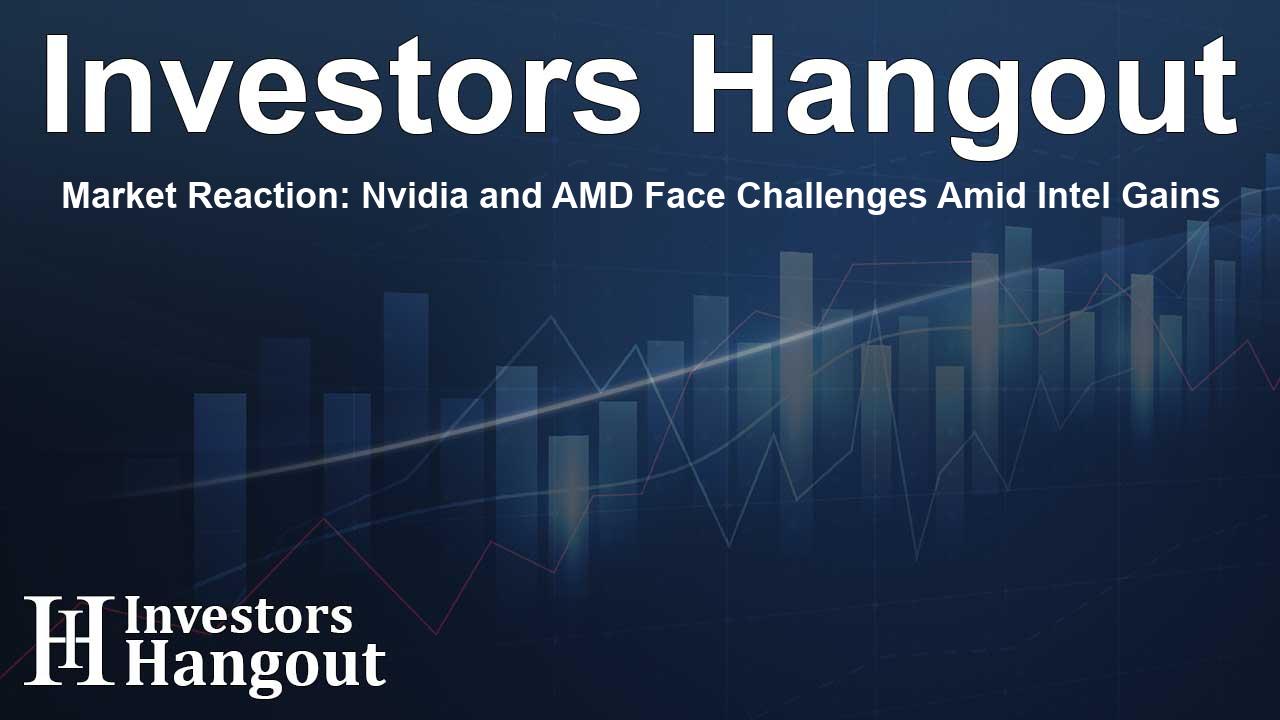Market Reaction: Nvidia and AMD Face Challenges Amid Intel Gains

Overview of Semiconductor Market Movements
In recent trading, semiconductor stocks have exhibited dramatic shifts, with notable declines in shares of Nvidia (NASDAQ: NVDA) and AMD (NASDAQ: AMD), while Intel (NASDAQ: INTC) experiences a rise. This contrasting performance highlights the volatility and challenges facing these tech giants.
Impact of New Revenue-Sharing Agreement
A significant factor contributing to Nvidia and AMD's current predicament is a groundbreaking revenue-sharing agreement with the U.S. government. This arrangement mandates that both companies pay 15% of their revenue derived from AI chip sales to China. This deal applies to specific chips designed for artificial intelligence applications, such as Nvidia's H20 and AMD's MI308. The agreement follows a previous halt on H20 chip sales to China, ostensibly to address national security concerns.
While this revenue-sharing deal has enabled Nvidia and AMD to maintain essential access to the Chinese market—accounting for a substantial portion of their overall sales—it also introduces new financial challenges. The 15% cut significantly impacts profit margins and raises questions for investors regarding the potential for government intervention in private business practices.
Geopolitical Risks and Market Sentiment
Analysts are expressing unease about the long-term ramifications of this deal in the semiconductor industry. The possibility that similar arrangements may be imposed in the future looms over business strategies, as companies navigate the complex geopolitical landscape. This uncertainty could compel companies to reassess their operations in China, further complicating their market strategies.
Criticism of Policy Consistency
Critics of the revenue-sharing arrangement question its fairness and necessity, arguing that if these advanced chips are deemed adequately safe for export, the imposition of a revenue share appears contradictory. This inconsistency creates a cloud of uncertainty surrounding the future of U.S.-China trade relations in technology.
Intel’s Positive Outlook Following White House Meeting
Contrary to the downturn faced by Nvidia and AMD, Intel's stock is experiencing an upward trend of 1.50%, reaching $20.25. This positive shift is largely attributed to the news that CEO Lip-Bu Tan is scheduled for a crucial White House meeting. Tan's engagement comes at a sensitive time, particularly after the President recently expressed concerns regarding Tan's business connections.
Addressing Concerns in High-Stakes Meeting
This meeting represents an essential pivot point for Intel. It gives Tan the chance to mitigate concerns about his previous associations, particularly in light of Cadence Design Systems’ recent legal troubles stemming from sales to a Chinese military university. The opportunity to engage directly with the administration could enhance Intel's standing and facilitate a stronger partnership with the government.
Potential Benefits for Intel
Despite the challenges it faces, a successful meeting could reinvigorate Intel’s prospects, fostering stronger ties with the government that may lead to increased support and collaboration on semiconductor initiatives. This positive engagement could position Intel favorably against its competitors now facing additional revenue-sharing requirements with the government.
Conclusion: Market Implications and Future Directions
The contrasting paths of Nvidia, AMD, and Intel in today’s market depict a landscape of uncertainty, opportunity, and risk for semiconductor companies. Investors will be keenly watching how these developments unfold, particularly concerning the potential for ongoing government regulation and the ability of firms to navigate these challenges effectively.
Frequently Asked Questions
What is the current market status of Nvidia and AMD?
Nvidia and AMD have experienced stock declines, driven by new revenue-sharing regulations with the U.S. government impacting their operations.
What prompted the revenue-sharing agreement?
The agreement was instituted as a condition for maintaining export licenses for AI chip sales to China, following national security concerns.
How does the revenue-sharing deal impact profit margins?
The 15% revenue cut significantly reduces profit margins for both Nvidia and AMD, raising concerns among investors.
Why is Intel's stock rising amidst these challenges?
Intel's stock has risen due to positive investor reactions following CEO Lip-Bu Tan's upcoming White House meeting aimed at strengthening government relations.
What are the broader implications for the semiconductor industry?
These developments signify potential regulatory challenges and geopolitical risks that companies in the semiconductor sector will need to navigate moving forward.
About The Author
Contact Thomas Cooper privately here. Or send an email with ATTN: Thomas Cooper as the subject to contact@investorshangout.com.
About Investors Hangout
Investors Hangout is a leading online stock forum for financial discussion and learning, offering a wide range of free tools and resources. It draws in traders of all levels, who exchange market knowledge, investigate trading tactics, and keep an eye on industry developments in real time. Featuring financial articles, stock message boards, quotes, charts, company profiles, and live news updates. Through cooperative learning and a wealth of informational resources, it helps users from novices creating their first portfolios to experts honing their techniques. Join Investors Hangout today: https://investorshangout.com/
The content of this article is based on factual, publicly available information and does not represent legal, financial, or investment advice. Investors Hangout does not offer financial advice, and the author is not a licensed financial advisor. Consult a qualified advisor before making any financial or investment decisions based on this article. This article should not be considered advice to purchase, sell, or hold any securities or other investments. If any of the material provided here is inaccurate, please contact us for corrections.
